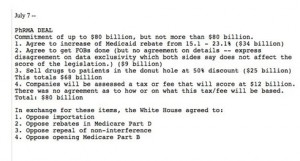An army of 50,000 highly motivated citizens condemning health care reform
Who are all of those outspoken citizens attending the town hall meetings where health care reform is ostensibly being discussed? The Raw Story reports that 50,000 of them are not simply concerned citizens:
A spokesman for America’s Health Insurance Plans, the industry’s trade group, admitted in an article published Monday that as many as 50,000 industry employees are involved in an effort to fight back against aggressive healthcare reform . . . “The health-insurance industry is sending thousands of its employees to town-hall meetings and other forums during Congress’s August recess to try to counter a tide of criticism directed at the insurers . . . Employees of the health insurers have also been given talking points . . .Question: Who is more motivated to show up and speak up at public meetings concerning health care? A) Ordinary citizens or B) Employees of health care insurers who are being PAID to show up and who are being provided talking points? The obvious answer is B), and they are contaminating discussions from coast to coast. The bottom line is that what is going on is not honest spirited debate out at town halls. Rather, what we are being subjected to is corrupted debate, to match the corrupted debate inside of Congress, where six highly paid health care lobbyists are assigned to each member of Congress, as reported by the LA Times:
Every one of those 534 members of Congress now has six (6!) lobbyists working on them -- and that's just for healthcare. A total of 3,300 lobbyists have registered to drive the sizzling healthcare issue in Washington -- three times the brigade of lobbyists representing the entire defense industry.It makes you want to throw up your hands (and sometimes, just throw up), thinking that we are sending sheep to the wolves whenever we hope that regular folks would be able to make as much focused noise on the topic of health care reform (and especially health care insurance reform) against financially motivated and highly-trained armies who are not attending these meetings to do anything other than advocate the pre-determined positions of their employer corporations and to prevent any meaningful discussion. Based on what I am reading and hearing, the presence of these highly vocal and highly biased participants is all the worse because they aren't identifying themselves as such at public hearings. In most things, we ask people of bias to identify themselves, because we should downplay the positions of biased people, because they are less trustworthy. They should be impeached for their positions of biased, the way we impeach biased witnesses in courtrooms. But there is no practical way to identify these financially motivated people at town hall meetings. They are presenting themselves are neutral ordinary citizens when they are anything but. For me, this "health care" debate is increasingly turning into a question of how (or whether) we are able to have any meaningful national discussion where one of the sides is financially powerful. This is especially a concern where investigative reporting is disappearing (but thank you, LA Times).

